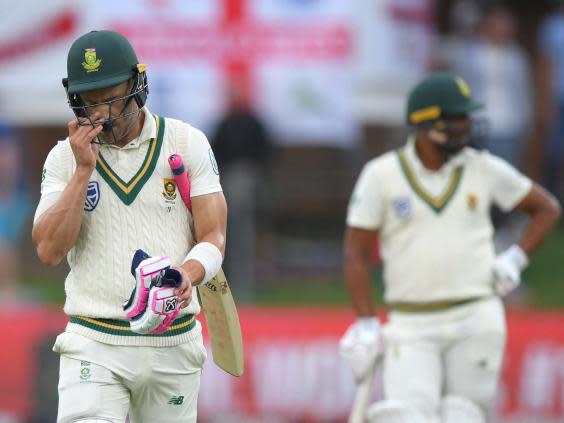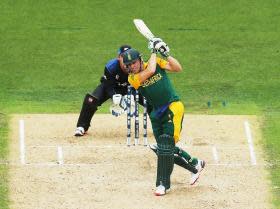South Africa vs England: Faf du Plessis deserved better than this Proteas side as captain nears end
If you want the best indication of how this series has flipped, consider that after South Africa won the first Test by 107 runs, Faf du Plessis defended Joe Root’s captaincy. Now, two England wins on, Root was returning the favour.
When the guts of du Plessis’ situation was put to Root – that the final Test may be his last as captain and certainly his last in South Africa – the question was dismissed outright. It was no concern of his, but he took the cue to praise his opposite number.
It was no surprise of course. On the field, the captain is always the most targeted player: a big name, the head of the snake, the one who takes the hit of defeat heavier than others. But off the field, there is a kinship between those who meet to toss a coin.
Root of all people will empathise with du Plessis. Even as an innings-and-53-run win was confirmed on Monday morning, Root was hammered in some quarters for his tactics.
There’s every chance the England captain would have come across du Plessis’ words from Centurion, too, and maybe that is why he talked about his worth: “a fantastic leader, a very good captain and a fine player.”
But it is not hard to chip away the platitudes and wonder if any of it is still true.
As a player, he has been found wanting: a number four batsman who has returned 113 runs from six innings. His application, too, can be questioned especially when you cast your minds back to South Africa’s second innings in Cape Town when he chose to slog-sweep Dom Bess to square leg when all he needed was time.
Some of his on-field calls have been misguided. Despite being regarded as an astute reader of the game, he’s made a habit of chasing the ball with some of his positionings and tried to be too clever in some instances: not giving Kagiso Rabada the new ball; dropping all-rounder Dwayne Pretorious and replacing him with a bowler in Dane Patterson when you need batting and, of course, picking Dane Patterson.
He has faltered uncharacteristically as a leader, too. Questions on the make-up of the international sides and meeting transformation targets have caused him as much discomfort as England’s attack.
Read more
De Villiers could return for South Africa at Twenty20 World Cup
The suspension of Kagiso Rabada for the last Test presents a real quandary beyond replacing a quick of that quality. The player likely to come in to redress the balance in more ways than one is Temba Bavuma who has been the subject of the questions in du Plessis's press conferences that have garnered the most awkward answers.
There is a real sense South African cricket has never been lower since readmission in 1991. And you could say the same about their captain’s stock. A once suave fighter has never looked more dishevelled. The designer stubble is not as sharp around the jaw. The hair not so much just-out-of-bed but, rather, desperate for it.
As we enter du Plessis's final phase as a Test cricketer there feels a palpable sadness. He says he will reassess his position outright at the end of the Twenty20 World Cup in Australia later this year, and the desire to win that is especially great for a side who have fallen short and a player who has little to show after nine years of gusto. Given how many of his high-profile teammates have moved on in the last couple of years, history may unkindly remember him as the one who turned the lights off as the last one out.
He averages 40 in the longest format: fine for some, but not so for him. There have been just nine hundreds and, perhaps more jarringly, only 64 caps. By way of comparison – Joe Denly, who made his England debut just under a year ago, already has 13.

What has not been lost among poor form and a tough series has been a sense of duty. When skills start to wane and the eyes and hands stop being as attuned as they once were, the heart takes tries to split the difference. His sense of doing right by others is as strong as ever: ”The worst thing a leader can do is pull the plug mid-series and say, ‘Sorry boys, I’m out. I’ve had enough.’ I don’t think that’s what leadership is about. You have to stick through the tough times as well.”
“If you leave the team when they need you most, that’s not my style. I have been under pressure a lot of times as a player and I’ve come through those times.”
The series is not done of course. A South Africa win at the Wanderers, which begins on Friday, will square it 2-2 and not just stop England from winning but ensure the hosts do not lose a third series in a row.
There is hope, too, that the imminent retirement of Vernon Philander will inspire the Proteas to provide him a winning send-off. Many of their stars leave ignominiously in the night over here, so the chance to bid farewell to a bowler who has served with distinction should be seized.
Read more
How England created perfect environment for young players to shine
And du Plessis is no different in that regard. But, as captain of a struggling ship, the situation dictates his departure will be regarded as a solution first and a shame second. A record of 18 wins in 35 combined with an average of 29.25 since the start of 2018 means the underlying sentiment over any stepping down will be that he was due to be pushed anyway.
Yet when you look at his career on paper you wonder if the reflection over the next week and beyond should not be what Faf du Plessis could have done better but what South Africa could have done better for Faf du Plessis?
During his time at Afrikaanse Hoer Hoër Seunskool, they used to say AB de Villiers was the best multi-talented sportsman at the school. But du Plessis was undoubtedly the best cricketer. Yet his career, even in limited-overs cricket, feels distinguished yet unfulfilled.
Root will be asked again for comment on du Plessis, perhaps even to pay tribute upon his departure.
What he won’t say is that du Plessis was a fantastic leader, a very good captain and a fine player – who, ultimately, should have achieved more. But he would be right to.




